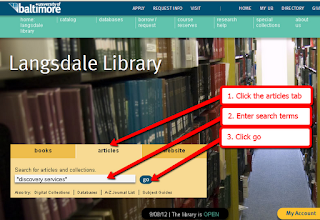 |
| The One Ring by Suzi Duke on Flickr |
One of the things we hear from students who are looking for information is that they don’t always know where to begin. Given that the library provides access to millions of articles through over 100 different databases, perhaps this is not so surprising.
Starting this semester, Langsdale is providing access to the vast majority of our materials through a single search box that uses something called the EBSCO Discovery Service or EDS. You can use it right now and it will find everything from articles to books to encyclopedia articles on your topic. Even more content and features will be added over the next few months, like content from our Special Collections and an easier way to request books that you may find through your search .
If you are a frequent user of library databases, the “EBSCO” part of EDS might seem familiar. Many of our most popular databases, including Academic Search Premier, Business Source Premier and PsycInfo, are licensed from EBSCO and you might even have come across a blue and green EBSCOhost logo while searching within these databases. Now, I know what you are asking yourself: “How is this EBSCO Discovery Service different from all the other EBSCO databases available in the library?” Well, I’m glad you asked.
EDS is one of several products that are known in the library world as “Next Generation Discovery Services” or “Web Scale Discovery Services”. The goal of these discovery services is to create a single place to search all of the library collections instead of having to repeat a search in multiple databases. On the surface this sounds like it should be easy. After all, if everything is searchable on its own, how hard is it to make everything searchable at once? Unfortunately, things are seldom quite as easy as they appear. Part of the problem lies in the ways our databases are licensed. EBSCO is only one company that licenses databases of articles to libraries. We have numerous articles provided by other companies such as competitors to EBSCO like ProQuest and the GaleGroup as well as some individual publishers like Sage and CQPress. Each of these companies has their own platforms and they don’t always play nice with each other. To make things more challenging, EBSCO and ProQuest have competing discovery services, and they both try to get a competitive edge by not allowing other companies to have direct access to their data. The discovery service providers have found some pretty ingenious ways to work around this, cobbling together data directly from publishers and utilizing existing library services (such as our FindIt button) in order to incorporate the full text across a large number of databases on different platforms. While none of the discovery services reach the goal of providing access to 100% of the content available, they do successfully encompass the majority of what is available.
So while EDS does not add anything in the way of full text content to our collections, it does provide a way to find most of that content in one place. Sometimes, you still may find it more efficient to search a database that is more focused on your specific area, but if you are unsure which of those 100 databases to choose, EBSCO Discovery Service is a great place to start.
 |
| The One Search Box at Langsdale Library |
Oh, one final thing. When I wrote a few paragraphs ago that I knew what you were thinking, I probably got that one wrong, didn’t I? No, instead you were probably wondering “How do I get to this magical search box?” As a reward for reading this far, I am going to tell you. All you need to do from the Langsdale home page is:
- Click on the articles tab
- Enter some search terms
- Click go.
And away you go. Happy discovering.
One search box to rule them* all
One search box to find them
One search box to bring them all
And in the darkness cite them!
* "Them" being all the sources you need for your papers.
This should save precious time.